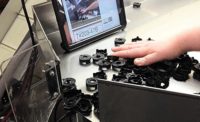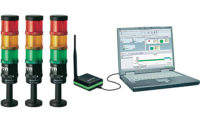Process Monitoring Helps Molder Achieve Zero-Defect Production




Tessy Plastics is one of the largest custom medical device and consumer component contract manufacturers in the Unites States. Founded in 1973, the company engineers, manufactures, assembles and distributes a wide range of plastic products. Tessy utilizes Scientific Injection Molding (SIM) to define and optimize the molding process from start to finish.
SIM relies on sensors and sophisticated software that monitor each phase of the injection-molding process. This allows engineers to control and adjust, in real time, critical variables like temperature, flow rate, fill rate, and cooling temperature to maintain a precise, repeatable production process.
For Tessy, zero-defect production is the daily standard. To achieve that during injection molding, Tessy relied on Kistler cavity-pressure sensors that monitor tolerance limits to minimize rejects and reduce scrap.
Ben Passetti, a research anddevelopment engineer at Tessy, and his team asked themselves how to make part production faster, at a higher quality and more cost-effective for the company and the customer. After reviewing Kistler’s extensive product portfolio, Tessy decided to implement and combine several Kistler products to achieve a competitive edge.
“To engineer a solid solution to these challenges, Kistler process monitoring sensors and systems have decidedly been the effective solution,” says
Passetti.
Tessy needed pressure sensors that could detect molding inconsistencies on a micro scale. Kistler’s piezoelectric pressure sensors were able to meet the challenge by identifying variations between the machines, preventing molds from being overpacked and detecting short-fills in real time. This allows for adjustments to be made quickly, minimizing waste and defects.
Tessy also implemented Kistler’s maXYmos and ComoNeo process monitoring and control systems. The maXYmos for process monitoring allows engineers at Tessy to evaluate specific products and production steps on the basis of a curve (force or flow over time, for example). The ComoNeo uses the cavity pressure profile to monitor and evaluate the quality of an injection-
molded part.
“We added the maXYmos to give us a better understanding of what the components actually look like to ensure they are fully formed and are able to move into the production stage with 100 percent zero-defect results,” notes Passetti. “We also chose to implement Kistler’s ComoNeo process monitoring system because prior to its implementation, we were struggling to understand what was happening in the mold itself to achieve accuracy and repeatability.”
For example, the injection molding process had an issue with machine speed, causing damage to the mold itself. With the process monitoring system, Tessy is able to stop the machine before the mold is overpacked and damaged.
By combining Kistler process monitoring systems and sensors, Tessy has not only achieve optimized process efficiency and quality assurance, but also gained a competitive edge. They have reduced waste by predicting when scrap is made in real time, and adjusting the processes to avoid making further scrap.
“We are definitely satisfied with Kistler solutions. We have been pushing the boundaries of facility size limitations for our machinery. We know that Kistler is continuously working to provide smaller systems and sensors to fit this need, especially on the micro-scale side, and we are happy with how much easier it allows for their integration into our machinery,” notes Passetti.
For more information on process monitoring sensors and systems, call 248-668-6900 or visit www.kistler.com.
Looking for a reprint of this article?
From high-res PDFs to custom plaques, order your copy today!







